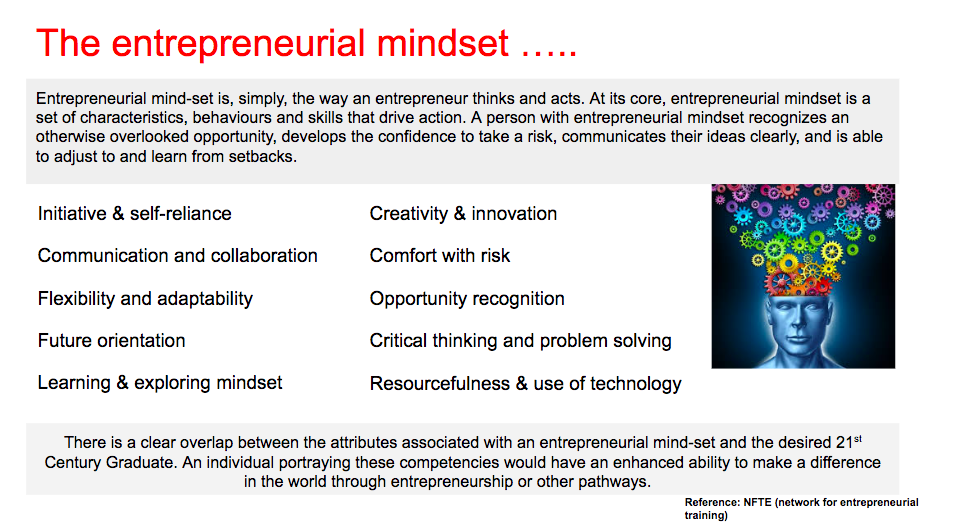Should an entrepreneurial education be offered to all university students?
From the student perspective, the answer is certainly “yes”; and from the perspective of the institution the answer is probably a “yes” as well.I need to start with a disclaimer: the last 6 years of my life have been focussed on developing Mashauri: an education platform for universities to enable them to offer their students an entrepreneurial education - so I may have a slight bias here. On the other hand, the research we have conducted and the experience gained, have done nothing to dissuade me from this - although we have received some negatives from certain quarters (see later).This article lays out the benefits of entrepreneurial education from the perspective of the student, the university and the community and economy. We end with a hint of the challenges of providing such education - as a run-in to a subsequent article due to be published soon. However, before discussing the benefits, we begin by explaining what we mean by entrepreneurial education. We have not set out to make this a long, academic paper but rather have tried to put our views across succinctly with some useful questions for deliberation at the end of each section. We trust this will not offend our readers (the majority of you are academics), and hope that you value the utility and brevity of the contents.
What is entrepreneurial education.
In our view (and the view of many, including the UK enterprise and entrepreneurship guidance), entrepreneurial education teaches a scientific approach to conceiving, launching and growing a new business through experiential learning. In most cases, that means by the student actually undertaking some or all of these phases and learning-by-doing. The advantages of such are not only that the student internalises a reusable approach but furthermore starts to gain some of the cognitive skills that make up an entrepreneurial mindset including:
- Creativity and innovation
- Opportunity recognition, creation and evaluation
- Decision making supported by critical analysis, synthesis and judgement
- Implementation of ideas through leadership and management
- Action and reflection
- Communication and strategy skills
- Digital and data skills
Benefits for students
“There are a number of reasons I am going to uni, but the key one is to lay a strong foundation for my career.”Dani G.: University of Leeds.
Entrepreneurial education has four main benefits for a student.
- It opens up the possibility of
becoming an entrepreneur as a viable career choice.
Surprisingly, in many universities the majority of students do not get the appropriate exposure that even allows them to consider this; and certainly not sufficient information to help them evaluate their propensity to undertake such a career. - The competencies, attitude and
experience increase the immediate employability of that student.
Corporates and other graduate employers are looking beyond the academic results to select employees who might eventually become leaders of their organisations. A quote from the WEF report on “What skills do employers most value from graduates” highlights this point:
“The kinds of skills cultivated through social entrepreneurship are linked to the soft skills that graduate employers have repeatedly told us they prize, but which they believe graduates lack. Chief among these are creativity, resourcefulness, team-working, innovation, resilience, IT skills, and innovation.” - There has been a rise in social and environmental consciousness among students in the last decade. Entrepreneurship, especially social entrepreneurship is a potential path to allowing these students to work in these areas where they feel they are able to make a more direct impact on these areas of concern.
- The skills developed in obtaining an entrepreneurial mindset track closely many of the skills required in the “21st century graduate” which are essential to becoming a useful global citizen who is able to guide their own destiny through an uncertain future.

DVC Key questions
- How well are you meeting students’ needs for employability post graduation?
- Are students in all faculties being exposed to entrepreneurship or is it focussed in the business and commerce areas?
- How far have you moved to developing real life skills for students?
Benefits for the institution
“At National University
of Singapore, we offer entrepreneurial-minded individuals the platform to
pursue their dreams and achieve success. Our goal is to nurture current and
future entrepreneurial leaders for business success, while igniting the spirit
of innovation and enterprise in our students, staff and alumni.”
Source: NUS Enterprise
We recognise 4 benefits of offering entrepreneurial education to the university
- It helps in the overall
positioning of the university when communicating to potential students,
parents and the world.
Although entrepreneurship is only recently beginning to appear on the university ranking tables, more and more applicants are beginning to consider this as a factor in their choice of institution. - It facilitates links with
corporates and public sector organisations.
Private sector are looking more and more to universities as a source of innovation as well as employees; and in return universities are seeking support in terms of funding and sponsorships. Entrepreneurial education can be a natural bridge between the two. - It encourages commercialisation
of research - and as such potential future income streams.
Technology Transfer Offices and Centres of Entrepreneurship / Innovation have the capacity to become strong sources of income for universities. - It may make the university
itself more entrepreneurial and intrapreneurial in its thinking and
approach.
The European Commission’s HEInnovate initiative discusses the importance of this as well as offering an assessment tool to measure how entrepreneurial is your institution (something which Mashauri could work with you in applying).
An interesting challenge and opportunity is that academic staff themselves seldom undertake entrepreneurial activities. This hampers their ability to teach entrepreneurship in an experiential fashion. The opportunity of creating “entrepreneurial academics” beyond teaching ability is in the way they look at the world and the potential impact on developing an entrepreneurial university.
DVC questions
- How consistent is your entrepreneurial education across the institution?
- How clear is entrepreneurship in your overall positioning?
- How closely tied is your TTO to all the entrepreneurial initiatives happening?
- How organised is your outreach programme to corporates and do you have a clear value proposition for them?
- How entrepreneurial is your university?
- As a DVC, how much are you thinking about the opportunities and threats arising from edtech-driven disruptive technologies?
Benefits for the community and economy
“Governments across the
world are looking to technology innovation as a driver for national economic growth, and to universities as the incubators of this national capacity. Universities operating within established technology-driven innovation hubs, such as Silicon Valley and Kendall Square in the US, offer robust models for success within these environments. However, an increasing number of universities located within more challenging environments are establishing strong entrepreneurship and innovation (E&I) profiles and reputations, some of whom will undoubtedly become future national and international leaders.”
Source: Creating university-based entrepreneurial ecosystems evidence from emerging world leaders. MIT-Skoltech initiative
The benefits for the community and economy are mostly self-evident.The key ones we come across in our work are:
- Students working on solving real problems in the community making an immediate impact and producing good relations with neighbours. Furthermore, communities and countries have problems that are unique and may not attract the attention of the global players to solve them.
- Job creation is driven by entrepreneurship (although there is significant debate around the quantum of this) and particularly in developing economies with high unemployment rates, it is often the only alternative for many individuals.
- Entrepreneurship and innovation go hand in hand and those countries with the highest innovation levels are likely to increase their share of the global economy. Israel is a case in point (WEF: Israel is a tech titan).
- Are you playing a role in national innovation?
- Are you recognised as a source of innovative individuals who could play upon the world stage?
- Do you know how well your alumni are doing against the above factor?
